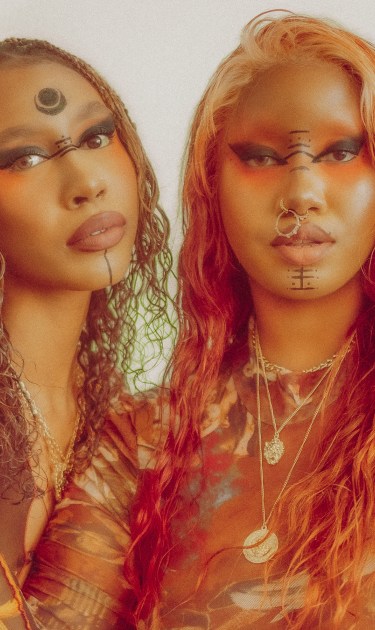A sister bond is hard to beat, and it can only get stronger if the sisters in question share mutual interests and passions. It’s the kind of connection that can make all the difference for a woman as she figures out who she is and who she is meant to be. Two sisters finding their place in the world through their love for music and performance—that’s the hero origin story of the R&B duo Bebi Monsuta, made of sisters Akira and Manami.
But their story began way before they were even born. Their cultural and spiritual heritage is a big part of their artistic vision and their music, which they describe as “kawaii-hop” (a combination of “kawaii,” meaning cute in Japanese, and taking “hop” from hip-hop). Bebi Monsuta, on the other hand, means “baby monster” in Japanese. It’s both a nod to part of their heritage and to their approach to life.
Like monsters in the making, Bebi Monsuta’s music is all about tapping into one’s inner power. Their first EP, 11:11, is deliberately released on November 11. It’s a glimpse of the symbolisms that run deep in the sisters’ work. 11:11, or 11/11, are known angel numbers, sequences of numbers that carry special meanings in numerology. “People make wishes at 11:11,” Akira tells Remezcla. “As we were making the EP, we were going through a lot of spiritual changes, a lot of growth in our personal lives, and we kept seeing the numbers 11:11.” After careful research, and talking to a friend of theirs who is a witch, Akira and Manami learned that 11:11 encompasses all the meanings they wanted for their debut EP. “New beginnings, manifestation, change, a new era of life,” Akira explains.
In more or and less explicit ways, these aforementioned messages pervade all six tracks of 11:11. “808,” which are angel numbers too, is a feel-good R&B song born out of the intention to manifest happiness and abundance. In the funk carioca track “Deuses Falsos” (which means false gods in Portuguese), the sisters criticize conceptions that don’t align with their belief in a God that “has the foresight to know when something is great in the making.”

11:11 tells Bebi Monsuta’s story in their own words, of their past, present, and future. Each song is a monument to specific moments of their lives. “It’s about coming out and embracing our background and heritage,” Manami says. Akira and Manami grew up in Brooklyn, New York, in a family of Brazilian, Trinbagonian, and Japanese heritage, surrounded by a very diverse array of music. “We grew up [listening] to all kinds of records: we listened to a lot of music from the 1960s, 1970s, 1980s. American music, Latin, Brazilian, Japanese–music from all over the globe,” Akira shares.
But while such a cultural mix was a natural part of who they are and the home they grew in, it wasn’t always easy for the sisters to embrace themselves fully. “We’ve been singing together since we’re in diapers,” Akira says. “But for so long we felt like we weren’t really allowed to show all of us. We were told you aren’t this enough or that enough.”
At its core, Brazilian music has a strong presence in the EP. Not only do “Whinin’” and “Deuses Falsos” have elements of different Brazilian genres, but Akira and Manami have been showing they have more than blood ties with the funk music made in Rio de Janeiro, where their grandmother lives. Back in 2019, the duo collaborated with Brazilian female rap trio ABRONCA for “Brazilian Sound.” “We love the sexual aspect of the female MCs [we know] in Brazil,” Manami shares. The powerful stage presence of ABRONCA, who were signed to the same label as Bebi Monsuta at the time, also left a big impression on the sisters. “We try to stay close to our heritage and make sure that even though we are in America, we can give bigger voices to the Brazilian music scene, and try to give back,” Manami says.

“We try to stay close to our heritage and make sure that even though we are in America, we can give bigger voices to the Brazilian music scene, and try to give back.”
And it’s notable. From their outfits to their self-choreographed music videos, the feeling of being comfortable in their bodies is a part of the message Bebi Monsuta wants to communicate. In pictures posted on their Instagram page, where the artists appear wearing golden headdresses and body paintings, they ooze the energy of sacred entities and mythological beings such as Oshun and Aphrodite—strong female figures who are empowered by their sexuality and inner force. It’s their homage to those that came before them, and the divine spirituality that lives through their art.
Acknowledging your roots so openly can be as liberating as it can be pressuring. And for Akira and Manami, encompassing all the cultures that shape their identity in their music is both a joy and a responsibility. “Whenever we make music, there is a pressure to represent different sides of us, because we want to showcase all of us to the world,” Akira says. “It’s really important for us to incorporate all of this into our music.” Manami adds that they’re also conscious of their privilege of living in New York, and so they try to amplify other voices, as well as their own as women of mixed heritage.
But the sisters have found a way to make it all come together, making music with which they feel comfortable rather than sounding like a forced tribute to their ancestry. “The way we are able to mix that together is what makes it so special because it’s not obnoxious, but it’s there in a way,” Akira says.

And it really is there. On the vocal vignette “Bebi Monsuta,” sung in-between song sections, working as tags to the tracks, they found a creative way of teaching people the right pronunciation of the Japanese words in the duo’s name. “That was a freestyle thing,” Akira says, sharing that the majority of the melodies in 11:11 were freestyled first before they wrote the lyrics.
“It’s always beautiful to see people around the world loving our music, and [being able to] touch as many hearts as possible,” says Manami. Then, Akira finishes our interview with words that may as well apply to every aspect of Bebi Monsuta’s music: “Open hearts, and hoping for the best.”
Listen to 11:11 below.





